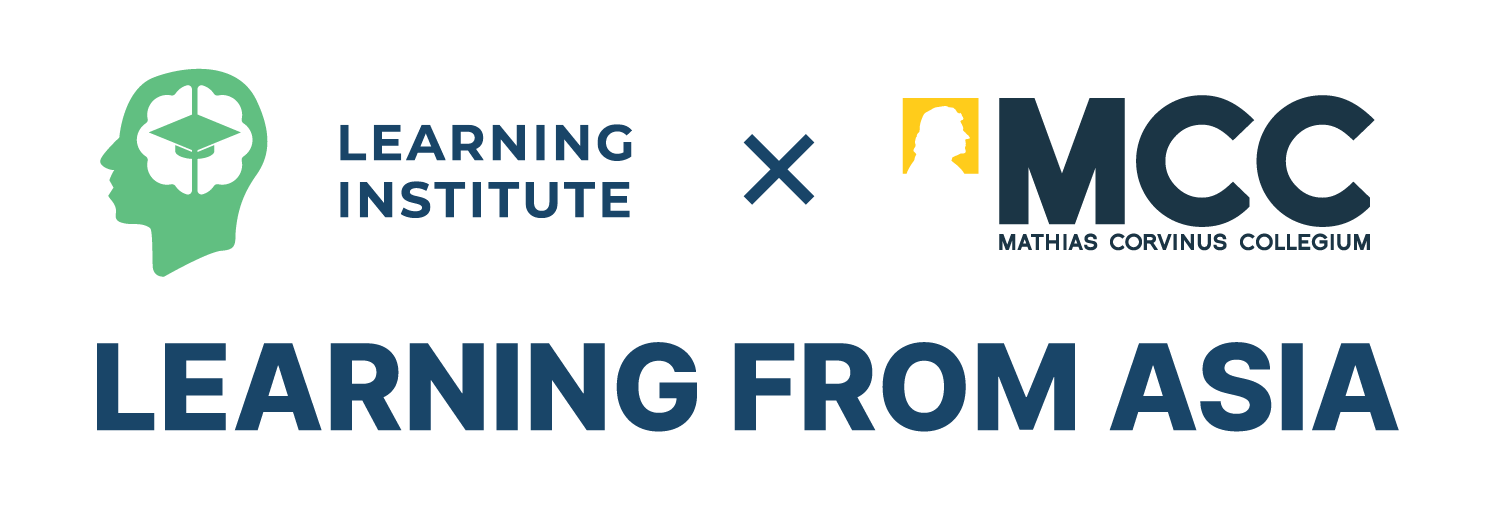The Learning Institute of the Mathias Corvinus Collegium (MCC) was established in 2021 under the leadership of professor János Setényi, a leading education policy expert in Hungary. Since its inauguration the Institute has been committed to cross-cultural learning, in general, and to Asia-Europe learning cooperation, in particular.
The “Learning from Asia” project is one of the projects run by MCC’s Learning Institute. It was launched in the autumn of 2022 with the professional mentorship of prof. Gábor Halász, a leading researcher of the Institute since its creation in 2021. Besides professors Setényi and Halász a project manager (Laura Kurthy), a junior researcher (Nyamkhuu Byambasuren) and a research assistant (Mizi Fan) are the members of the project team.
The project is, as its name shows, based on the assumption that Europe has much to learn from Asia, especially from those countries which successfully modernised their economy and society, mobilising effectively the potential of their education systems. This is a knowledge- building project aimed and exploring available knowledge about educational development in Asia, with a special focus on East and South-East Asia and China. A key goal of the project is to create intensive and continuous communication between European and Asian researchers and experts having a professional interest in the design and implementation of education policies, and being actively involved in the creation of the knowledge basis of these policies.
On the invitation of MCC’s Learning Institute, more than forty partners from various Asian and European countries have joined the project since its inception. The project partners have been invited to contribute to the development of the conceptual frameworks of the LfA project.
According to the project plan, an international conference/workshop will be organised in the Autumn of 2023. The Learning Institute has invited to this event a small number of educational researchers and experts from leading Asian national and international organisations. The invited guests, together with researchers from the host country, will be asked to share their ideas about the potential of Asia-Europe cooperation in education policy research and common knowledge building. They will also be invited to present the main outcomes of their related research or expert activities and to participate in a professional dialogue on possible future developments. A detailed agenda of the conference has been elaborated in cooperation with our partners. The MCC Learning Institute intends to publish a book based on the conference presentations.
We have developed a draft concept paper (“Issues paper”) which aims to provide a conceptual framework for the LfA project and also to orientate our dialogue during the Autumn conference. This concept paper was first discussed with our partners at the end of March 2023, and later with a group of Asian PhD students studying in Hungary. On the basis of this the document has been significantly revised.
In the framework of the project an “Asian PhD Forum” has been created. This is a community of Asian PhD students studying in Hungary who meet regularly (on a monthly basis). One of the aims of this Forum is to encourage Asian PhD students to explore Asian sources and references and to rely on these in their doctoral research parallel with the use of Western sources and references. This happens in line with the so-called “Asia as Method” approach. Another aim is to use the knowledge and experiences of Asian PhD students to improve the conceptual frameworks of the LfA project. The members of this PhD student community have been invited to attend the Autumn conference and to submit proposals for conference presentations. The activities of the “Asian PhD Forum” are guided by a strategic and an operational plan.
In May 2023 a fact-finding mission was conducted to China with the participation of three members of the project team. This mission aimed to explore the feasibility and the potential of the LfA project and to build of partnerships. The team visited 7 universities, 2 research organisations and 5 schools in Beijing, Shanghai and Hong Kong. A detailed record has been prepared about the mission. During our visit we received important feedback from several partners to the idea of the LfA project and also suggestions related with the draft concept paper mentioned earlier, which contributed to its revision.
In the framework of the project the MCC Learning Institute has proposed, among others, the implementation of a comparative survey of school-level innovations with Asian partners. This survey, based on data collection instruments already in use in Hungary, can provide valuable information about the innovation potential of schools. In case of positive responses from potential partners, the data collection instruments can be adapted to emerging new needs. The outcomes of the survey could be published in academic journals, and they can be also used to support the development of policies aimed at improving education.
The LfA project team cooperates with other project teams in the Learning Institute. It will provide, for example, specific inputs from an Asian perspective to another project aimed at exploring history teaching and civic education.
